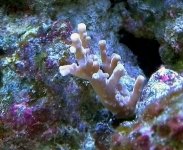A
Anonymous
Guest
How do you photo "pros" deal with oversaturation in a picture? I specifically mean the top of the coral being almost completely bleached out, and the bottom underside being overly dark. Is it all post-photoediting? Someway of taking the pictures I'm missing? What?
I mean sure it's a nice indication to seeing what part of the corals is getting the most light, but I still want to have some sort of photo-diary of their progress
For instance here's an acropora nana frag I recently got. I did use the auto-level tool in photoshop to bring the picture closer to what I can see (ie phase out the blue).

Here's the unedited picture incase there's some photo-dohickying some of you may want to try, full pic too not just the cropped piece.
http://img91.imageshack.us/img91/434/nana2ue3wl.jpg a little large so I'm just leaving the link.
I mean sure it's a nice indication to seeing what part of the corals is getting the most light, but I still want to have some sort of photo-diary of their progress
For instance here's an acropora nana frag I recently got. I did use the auto-level tool in photoshop to bring the picture closer to what I can see (ie phase out the blue).

Here's the unedited picture incase there's some photo-dohickying some of you may want to try, full pic too not just the cropped piece.
http://img91.imageshack.us/img91/434/nana2ue3wl.jpg a little large so I'm just leaving the link.






